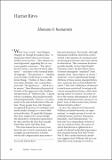Humans & humanists
Author(s)
Ritvo, Harriet
Downloaddaed.2009.138.3.pdf (119.8Kb)
PUBLISHER_POLICY
Publisher Policy
Article is made available in accordance with the publisher's policy and may be subject to US copyright law. Please refer to the publisher's site for terms of use.
Terms of use
Metadata
Show full item recordAbstract
“When I use a word,” says Humpty Dumpty in Through the Looking Glass, “it means just what I choose it to mean– neither more nor less.” Alice demurs on several grounds, appealing first to contrary popular consensus–“But ‘glory’ doesn’t mean ‘a nice knock-down argument’”– and then to the essential limits of language: “The question is . . . whether you can make words mean so many different things.” Neither of Alice’s objections fazes Dumpty, who counter theorizes that “the question is . . . which is to be master,” then illustrates the practical benefits of his approach with a brilliant interpretation of “Jabberwocky,” a poem whose vocabulary Alice had previously found impenetrable.1 There is, of course, much to be said on both sides of this debate. Many people have, like Dumpty, recognized the power of vocabulary and made similar attempts to control definitional borders. If, again like Dumpty, they have neglected to acknowledge the alternative viewpoints represented by Alice and her ilk, they have usually found this easier said than done.
Date issued
2009-06Department
Massachusetts Institute of Technology. School of Humanities, Arts, and Social SciencesJournal
Daedalus
Publisher
American Academy of Arts and Sciences
Citation
Ritvo, Harriet. “Humans & humanists.” Daedalus 138.3 (2009): 68-78. © 2009 by Harriet Ritvo.
Version: Final published version
ISSN
0011-5266
1548-6192